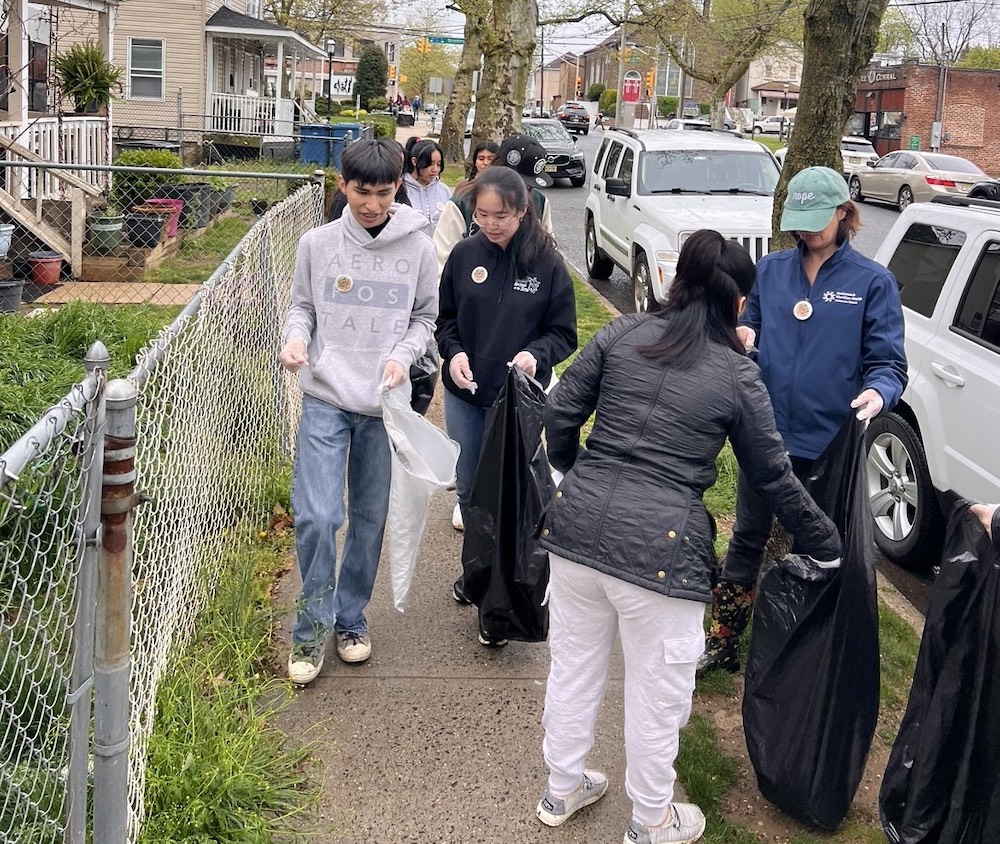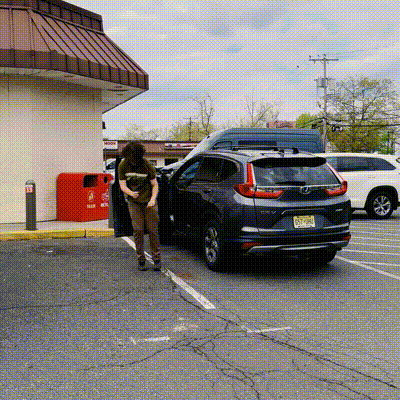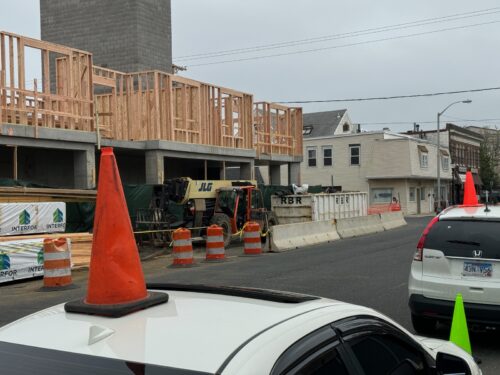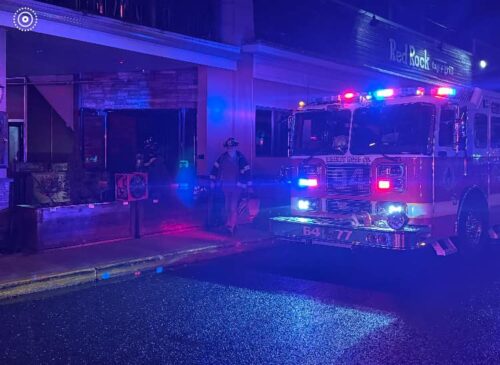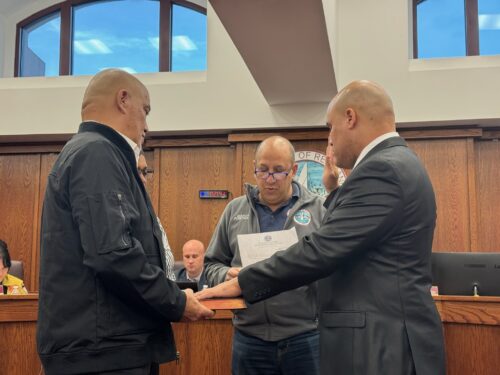The West Side property that’s the site of Best Liquors has been home to retail businesses for 90 years. For a good part of that history, it was a grocery, but since 1965, it’s been a liquor retailer, says store owner Pankaj ‘Sunny’ Sharma.
Sharma, who’s 30 years old, drives a red sports car and could pass for a matinee idol, has had the store for just three years. But in that time, he says, he’s been diligent about upgrading and maintaining the property.
He matched public funds to pay for a colorful mural along the store’s exposed southern wall. He installed halogen lighting outside and a camera system so he could keep an eye on things from his cash register. Recently, after complaints from neighbors, he hired someone to come by twice a day to pick up wrappers and other debris that customers drop on the sidewalk.
“All of this stuff, the store didn’t have before,” says Sharma. The effect, he says, has been to improve both the look of the corner and the safety. “Even the police chief said that in the last five years, crime is down 70 percent at this corner,” he says.
But Sharma’s neighbors, all of them homeowners, aren’t buying it. Citing a welter of complaints about noise, littering, public urination and prostitution that they say is getting worseand which they link directly to the store’s presencethey insist that it’s time for the shop’s long run to end.
No matter what it takes, they say, it’s time to shut Sunny down.
It’s nothing personal, the neighbors insist. They grant that Sharma has tried to be responsive. He’s attended a a Westside Community Group meeting to answer their complaints. He’s met with the police chief. In the words of a couple of residents, he’s “a nice guy.”
“I have no problem with Sunny,” says John Ross, of Leighton Avenue. “It’s the town’s fault for having a liquor store here.”
The intersection of Catherine Street and Leighton Avenue, though just a block west of busy Shrewsbury Avenue, is otherwise a residential neighborhood. And Best Liquors, the residents contend, is a longstanding attractive nuisance that’s getting worse in conjunction with a rising problem of overcrowding in rental homes on the West Side.
Ross and others maintain that the store derives a great deal of its business from a highly-transient population of tenants, many of them undocumented immigrants who he says have little regard for the neighborhood because their stays are so short. But he is reluctant, he says, to make housing the top issuefor now.
“Our biggest problem is the liquor store,” says Ross, a union electrician who’s owned his home for two years. “”It’s a quality-of-life issue, period.”
Last week, Ross and his neighbors banded together and descended on Borough Hall, unaware that a group led by South Street homeowners was also rallying before the council that night to complain about property tax increases. The result was a packed house, and a convergence of complaints.
One point of overlap: general agreement that hiring additional code enforcers would likely cut down on overcrowding of rental houses on the West Side while putting more money into the borough till in the form of fines imposed on negligent landlords. Mayor Ed McKenna said the borough is on it, with one new hire pending.
Residents also complained about what they said was a spotty record of response by the police to their calls.
On a recent Friday afternoon, Ross pointed out a patrol car parked opposite the store, and the relative quiet on the corner.
“Right now, it’s calm. Everything seems great,” he says. “With the police officer here, it’s never been quieter. But come back here at 8:30, 9 o’clock tonight. The police will be gone, things will pick up at the liquor store, and you’ll see why everybody here is sick to their stomachs about this.”
What you’ll see, he says, is noisy loitering, the occasional fight, drug dealing and possibly even some flesh trade. Ross, who seems to have an innate sense of stagecraft with a microphone in his hand, both amused and appalled the borough council session with a tale of how he emerged from his house one recent Saturday morning to pick up his newspaper and was graced with the sight of a topless hooker in front of the store.
Krishna Tyler, who lives with her family a few doors north of the business, says customers of the store park in front of her house, down their bottles of liquor, and toss the empties onto her sidewalk or over her fence into her front yard, often while blasting music over their stereos.
“It goes on an on,” she says of the disruptions. “It never ends.”
But none of that is Sharma’s fault, says Kevin Haskins of Drs. James Parker Boulevard, who’s been a customer of the store since it was known as Johnny Gent’s. “If people are hanging out, how could he put a stop to it?” asks Haskins. “Sunny does his best to chase them out. Johnny Gent’s had the same problem.”
Sharma contends that the recent rash of complaints is baseless, and that none of the residents have approached him in recent weeks, since he says he stepped up his monitoring of the property.
At the Sept. 25 council meeting, Mayor Ed McKenna said borough officials would explore various options available to deal with the situation, including the possible purchase of Sharma’s liquor license.
Police Chief Mark Fitzgerald is reluctant to talk about ongoing measures to address conditions at the corner in any detail, other than to say that the Police Department is working with residents to resolve the behavior underlying the complaints.
“It’s not a shopping area, it’s a neighborhood,” he says.
One approach residents shouldn’t count on a “Cops in Shops” solution. In July, Fitzerald indicated to the Hub that the borough might be able to place a patrolman on the premises in an effort to curtail violations. But grant money that the town has received in the past for a state program by that name didn’t come through this year, says Fitzgerald.
But Sharma could be facing trouble for some past alleged infractions, and the timing of their ajudication may prove particularly difficult for him, given the present level of outrage in the neighborhood. Three municipal court cases are pending against his business over allegations of sale of alcohol to minors disorderly persons offenses. (A court hearing that had been scheduled for today, Oct. 5, has been postponed until Dec. 28 because two of the witnesses are away at college, according to Fitzgerald.)
Should the store be found guilty of any of the pending complaints, the Borough Council could open an inquiry into the license itself, says Fitzgerald.
“It’s a privelege to have a liquor license, not a right,” says Fitzgerald.
Sharma pleaded guilty July 20 in municipal court to possession of contraband cigarettes, and says all the complaints are attributable to the actions of a wayward employee he fired after learning of the employee’s actionsvia his new security cameras.




